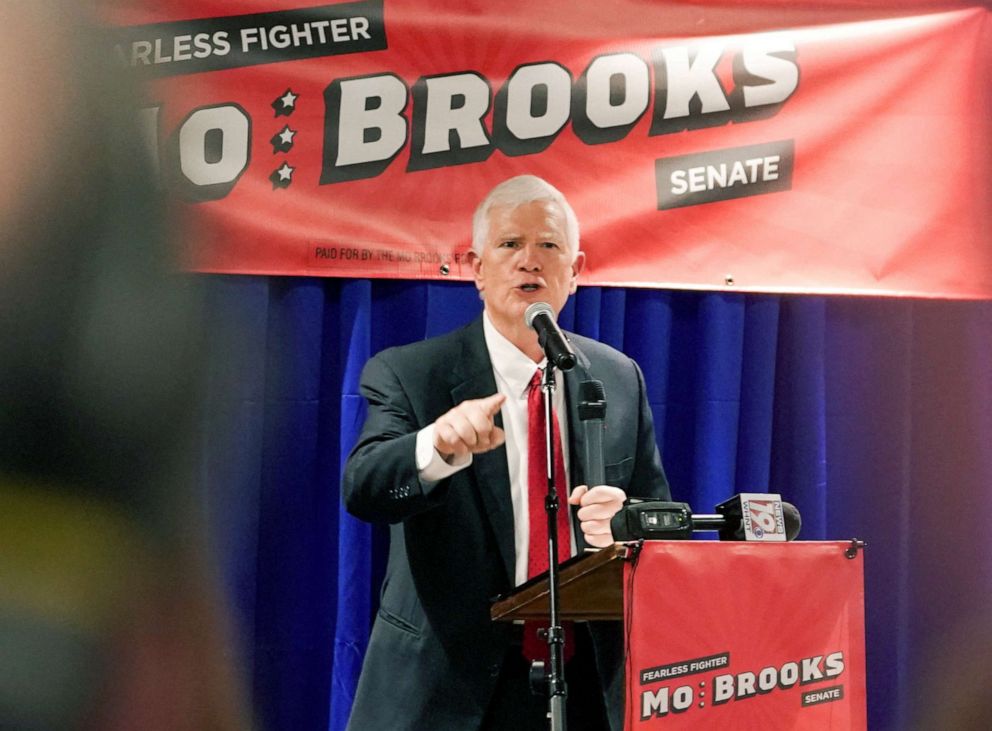Some Republicans continue to push for 'decertification' of 2020 election
Experts say the call is legally and constitutionally dubious.
While many mainstream Republicans look toward making waves in the midterm elections, some are still clinging to the past.
After GOP Rep. Mo Brooks' recently confessed that former President Donald Trump repeatedly urged Brooks to "rescind" the results of the 2020 presidential campaign, some Republicans are exploring -- even publicly vowing – to "decertify" President Joe Biden's victory, a move with no legal or constitutional basis.
In late March, Brooks told ABC News that Trump requested several times he "remove" Biden from office, under the fraudulent assertion that the 2020 election was somehow tampered with and illegally skewed in Biden's favor. Brooks, in his own telling of the interaction, said he refused Trump's requests, writing the move off as impossible.
"We didn't get into the details [of how it would happen] because it's legally impossible. And I explained that fairly promptly," Brooks told ABC News in a phone interview.
Brooks, who is now running for Senate from Alabama, disclosed this conversation to ABC News after Trump yanked his endorsement, in part for not aligning with Trump's baseless assertions regarding election interference.
Yet, in Georgia, Trump-endorsed Republican Secretary of State candidate Rep. Jody Hice is leaning into his ties with the former president, and was caught on camera earlier this week committing to decertifying Biden's win if elected after pursuing relevant legal investigations.
"That's why I'm in the race," Hice told Lauren Windsor, an activist journalist, who questioned the representative posing undercover as a supporter at the Columbia County GOP meeting. "If we lose fair elections, we're in trouble. We have to get to the bottom of this, and we've got to fix it going forward."

Hice's challenge to incumbent Brad Raffensperger, one of many of the former president's public enemies, showcases a clash of interests seen in Georgia's tumultuous Senate primary and in GOP races around the country. Trump-backed candidates who pursue his baseless claims of election fraud and push stringent revisions to election laws regardless of feasibility are facing off with Republicans who push back against Trump's bidding and risk losing favor from their constituency, and, in turn, public office.
Such tension exists within statehouses already. Wisconsin Assembly Speaker Robin Vos, a Republican, has shot down conversations by members of his own caucus regarding the possibility of decertifying Biden's victory in Wisconsin.
"I still believe that the Constitution and my oath that I took as an elected official does not allow me to decertify any election whether I want to or not," Vos said in March. "That's not going to happen."
Similar calls for action are cropping up in the Illinois secretary of state race, too, where conservative candidate and former police sergeant Michelle Turney, told the Chicago Sun Times that her first priority, if elected, would be to "decertify the 2020 Election on day one of my term."
While the promise of rewriting electoral history may be appealing to some voters, it's near impossible to execute legally, as Raffensperger contended on ABC News Live in January.
"The state election board cannot overturn the will of the people and it cannot overturn the election and it just wants to make sure that every county runs their elections well and I support accountability," said Raffensperger.

And legal experts agree. After the fact "decertification" is in no way feasible.
"Certification happens ahead of an inauguration. After inauguration, the only legal or constitutional way to remove a president is through impeachment. Period. The end," said ABC News legal analyst Sarah Isgur.
Kate Shaw, ABC News Supreme Court analyst and Cardozo Law professor, said there's "no mechanism" in the Constitution that would allow Republicans to deliver on this promise.
"The Constitution contains no mechanism for decertifying an election. Article II and the 12th Amendment, together with the Electoral Count Act, set forth the steps for counting state electoral votes and naming the president," said Shaw. "That happened in January 2021, and that bell cannot be unrung, whatever transpires in the states afterwards."



